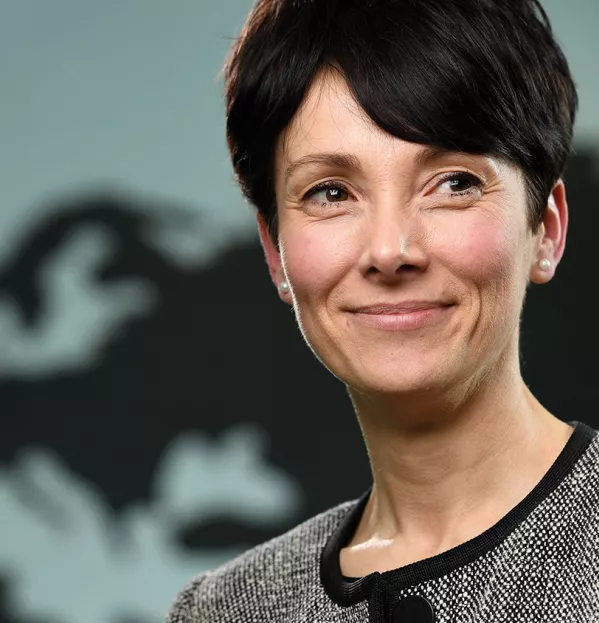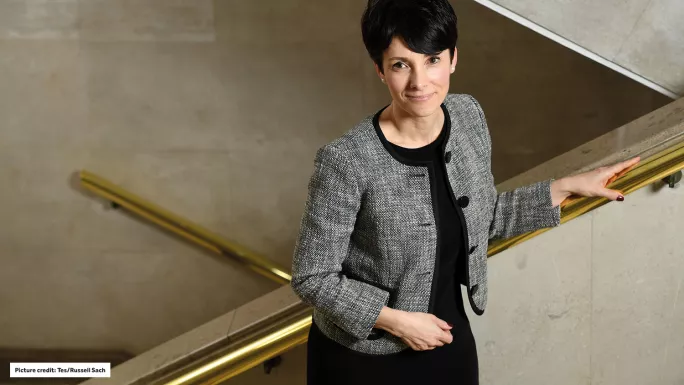‘I think that the sector as a whole would welcome some stability’

Sharon Hague doesn’t like to give much away. As senior vice-president for schools at education company Pearson, she oversees the marking of millions of papers each year by the Edexcel exam board. But asked what it’s felt like to have been at the centre of the biggest upheaval in assessment for years, she simply points out that her role is “to make sure that the changes that were proposed were implemented successfully”.
When later asked whether competition between boards is the best way to deliver exams, she plays another defensive stroke: “My job - the job of Pearson - is to make sure we do absolutely the best job we can in terms of delivering our qualifications.”
Then again, a devil-may-care attitude is not necessarily what you’d want from someone running an exam board. Navigating amid the turbulence of assessment and qualification reform, instigated by Michael Gove during his stint as education secretary, has probably required dogged focus and circumspection in equal measure. These are qualities that also come in handy at a time when Hague and her counterparts running other exam boards are faced with unprecedented scrutiny - when one dodgy exam question can whip up a social media storm.
A geography teacher by background, Hague was inspired to join the profession by a teacher who “really instilled a love of the subject in me”. She remembers him as a “very typical geography teacher”.
“He didn’t have a beard but he did have elbow patches,” she laughs. He made her feel that she was “really achieving”, taking her on an open-day visit to the University of Oxford, at which she later won a place. Hague stayed on at Oxford after graduating to complete a PGCE, before becoming a teacher because, as she says, she had been “lucky enough to have a really positive experience of education myself” and wanted “to make other people feel like that about a subject”.

In her current job, Hague is responsible for all of Pearson’s qualifications and assessments in the UK, together with all of its teaching and learning resources. So how do you go from being a geography teacher to doing that? She suggests the move was the result of accident as much as design. Hague took a job as head of department at a school that was opening a sixth form. “One of the reasons they appointed me was because of the experience I’d had teaching A levels,” she says. “I thought to myself, ‘what’s going to be the best way for me to really understand what makes a successful course?’ So I thought, ‘Oh, I’ll become an examiner.’”
While marking A-level geography scripts for Edexcel, she discovered “the more I got involved, the more interesting I found it”. When a job advert came up for a fixed-term contract at the exam board, a death in the family catalysed her decision to go for it.
“About the same time, my brother-in-law had died quite young,” she explains. “It made me think, if it’s something that interests me, I should try it and see what happens.”
It was a pivotal decision; Hague recently celebrated her 18th anniversary at Pearson. But she says she still feels like a teacher at heart, and believes her background in the classroom gives her “empathy” for how teachers are affected by exams.
“I still haven’t ruled out that one day I might go back into the classroom,” she says. “Where I feel it most these days is when I go with my children to their school and we go to a concert or a play or something. You see all these young people achieving so much…”
Hague gives a wistful sigh, before quickly adding: “Obviously there are lots of other things that come with teaching as well - it’s a demanding job.”
The same could be said about her own role - she’s had to help deliver the biggest shake-up of exams in a generation, including the introduction of “tougher” GCSEs, restructured A levels, a new 9-1 grading system for GCSE, the phasing-out of modules and coursework, and the “decoupling” of AS and A levels.
‘Huge amount of change’
Though clearly reluctant to say anything negative about the reforms, she admits “there has been a huge amount of change”. And asked what she makes of another bout of reform, Hague replies: “I think that the sector as a whole would welcome some stability.”
The shake-up of assessment is not the only thing that Hague has had to contend with. Modern technology can be a boon for exam boards by allowing for more efficient processes, but it also poses major challenges. Last summer, Hague personally had to apologise to headteachers after details relating to Edexcel’s A-level maths and economics papers were leaked via social media.
She plays down the threat that leaks pose to the integrity of the exam system, pointing out that malpractice is “exceptionally rare”. The “vast majority” of students and teachers “want to get a fair result from their qualifications”, she says. “What was really interesting in the summer is, firstly, students were very quick to notify us - which was great - and when you looked at the social media commentary, what you saw was this real strength of feeling among students that, actually, ‘we want to do our qualifications fairly’.”
But it is not just leaks that create problems. An error in a paper - or even an unorthodox question - can trigger a social media backlash. In 2015, a question on probability in an Edexcel GCSE maths paper - which quickly acquired the sobriquet of “Hannah’s sweets” - caused a Twitter storm; outraged teenagers declared it “the hardest thing ever to hit the human race”.
It seems as if exam boards are under more scrutiny than ever. But Hague insists that she doesn’t feel “under the spotlight”. The role of the board is to be aware of risks and make sure that they are being managed effectively, she says.
“It’s about having experience in delivering assessments; to listen, quickly understand whether there is a potential problem or not, and take action where there is.”
Edexcel has been quick to make the most of the positive opportunities presented by technology. This year, it became the first exam board to allow schools to access all marked GCSE and A-level papers free of charge through a new online portal. It led to a 528 per cent increase in the number of scripts accessed and, perhaps more significantly, a 17 per cent fall in challenges to grades.
Pearson launched the free service in recognition of the “budget pressure” that schools are under, and Hague hails it as “incredibly successful”. It has been suggested that offering free scripts could tip extra workload onto teachers by creating an expectation for them to go through large numbers of papers each summer with a fine-tooth comb, but Hague says Pearson hasn’t received such feedback.
The portal is only one of the technological changes Pearson has planned for our schools system; Hague says the company is looking at bringing “virtual schools” - an idea it has pioneered in the US - to the UK. The concept involves offering online courses, which she argues could help schools in “maintaining the breadth of their curriculum”.
“We’re looking at A-level Spanish at the moment as a potential area where we might deliver online courses,” says Hague. “It wouldn’t be replacing the school or the teacher, but it would provide the school with course content, structure and some of the delivery.”
‘Potential’ of on-screen tests
Beyond that, she says delivering exams via on-screen assessment “has lots of potential”. Pearson already provides a million such assessments a year, mainly relating to functional skills and work-based qualifications. She says adaptive testing (where the test changes according to the examinee’s ability level), simulation and interactive questions could allow examiners to get a “better understanding” of what students “do and don’t understand”.
Hague says she could “quite easily see” on-screen exams for modern foreign languages incorporating spoken and listening elements, or science exams in which you “almost have an interactive experiment, and add a chemical to see what happens and record it”.
Some people have questioned the financial viability of exam boards, given that their income has been hit by the end of modular exams, a dramatic reduction in resits and the decoupling of AS and A levels. But when probed about this, Hague’s straight bat reappears. Pearson is “absolutely committed to the UK qualifications market”, she says.
As to what keeps her committed, she says it’s thinking about the difference she can make to teachers and students. “The harder we try, the better the job we do, the more we have an impact and we help teachers and students, and that’s what gets me out of bed every morning.”
But running an exam board does come with drawbacks. Hague will soon be experiencing assessment from a different point of view: her son is about to make his GCSE choices. She’ll go through all of the stresses and tensions of any parent whose child is doing exams, but compounded by how much she knows about the system.
“I’m dreading it!” she laughs. “Especially when he tells me, ‘No, no, no, Mum, you don’t need to do that.’ I know you do! I’m not looking forward to that at all.”
You need a Tes subscription to read this article
Subscribe now to read this article and get other subscriber-only content:
- Unlimited access to all Tes magazine content
- Exclusive subscriber-only stories
- Award-winning email newsletters
Already a subscriber? Log in
You need a subscription to read this article
Subscribe now to read this article and get other subscriber-only content, including:
- Unlimited access to all Tes magazine content
- Exclusive subscriber-only stories
- Award-winning email newsletters